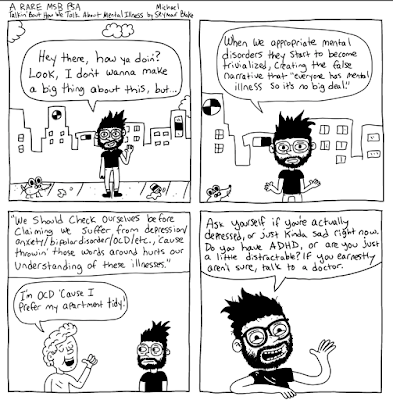In today's post, Lucienne Spencer (University of Bristol) discusses the wrongful depathologization of serious mental conditions. The post is based on a paper co-authored with Havi Carel and published open access in Philosophy of Medicine.
 |
| Lucienne Spencer |
The Mental Health Foundation states that ‘people with mental health problems are amongst the least likely of any group with a long-term health condition or disability to find work, be in a steady, long-term relationship, live in decent housing [or] be socially included in mainstream society’. Given the global decline in mental health following the coronavirus pandemic, addressing the marginalisation of people with psychiatric illness has never been more urgent. According to the literature, this marginalisation is grounded in sanist attitudes that portray people with psychiatric illness as ‘dangerous and frightening’, ‘incompetent to participate in “normal” activities’ and ‘morally repugnant’.
While some psychiatric illnesses are solely grounded in such stigmatisation (such as schizophrenia and other forms of psychosis), we argue that other psychiatric conditions may also be vulnerable to trivialisation. Have you ever heard someone say, ‘that football match last night gave me PTSD’ or ‘I can’t handle social situations, I’m so Autistic’ or even ‘I love having my kitchen organised- I’m slightly OCD’?
 |
| Comic by Michael Seymour Blake (Instagram @michaelseymourblake) |
While some psychiatric illnesses are solely grounded in such stigmatisation (such as schizophrenia and other forms of psychosis), we argue that other psychiatric conditions may also be vulnerable to trivialisation. Have you ever heard someone say, ‘that football match last night gave me PTSD’ or ‘I can’t handle social situations, I’m so Autistic’ or even ‘I love having my kitchen organised- I’m slightly OCD’?
When we make light of psychiatric illnesses in this way, we risk reducing a serious condition to a mere personality trait. Consequently, people with these kinds of psychiatric illnesses are more likely to be met with scepticism regarding the severity of their illness; characterised as ‘just like everyone else’, yet labelled as ‘difficult’, ‘manipulative’, or ‘attention-seeking’. Therefore, while these conditions are still subject to systematic stigmatisation, they can also be trivialised. We call this simultaneous operation of stigmatisation and trivialisation of a psychiatric illness ‘wrongful depathologisation’.
Our new article uses OCD as a case study to focus on one distinct harm that may emerge from wrongful depathologisation: epistemic injustice. First, if a condition like OCD is not perceived to be as complex or debilitating as the patient claims, testimony that goes beyond the palatable aspects of the condition is not taken seriously. This would constitute a case of testimonial injustice.
Our new article uses OCD as a case study to focus on one distinct harm that may emerge from wrongful depathologisation: epistemic injustice. First, if a condition like OCD is not perceived to be as complex or debilitating as the patient claims, testimony that goes beyond the palatable aspects of the condition is not taken seriously. This would constitute a case of testimonial injustice.
 |
| Havi Carel |
Second, wilful hermeneutical ignorance may occur if a diagnostic term, like that of ‘OCD’, is misappropriated by those who do not have the condition. Rather than using the term to refer to a serious psychiatric illness, ‘OCD’ is frequently used to describe an inclination towards tidiness and organisation. Through this misappropriation, the true meaning of the term ‘OCD’ is suppressed and loses its hermeneutical power.
We hope that the concept ‘wrongful depathologisation’ may open a space for new ways of understanding other marginalised experiences that are simultaneously stigmatised and trivialised. For example, cases of rape, sexual assault and domestic abuse, where the individual is vulnerable to stigmatisation and victim-blaming, yet their experiences may be trivialised due to cultural attitudes that normalise sexual and domestic violence. As a new contribution to the literature, we hope that the concept of wrongful depathologisation may bring to light further cases of epistemic injustice driven by the paradoxical twining of stigmatisation and trivialisation.
We hope that the concept ‘wrongful depathologisation’ may open a space for new ways of understanding other marginalised experiences that are simultaneously stigmatised and trivialised. For example, cases of rape, sexual assault and domestic abuse, where the individual is vulnerable to stigmatisation and victim-blaming, yet their experiences may be trivialised due to cultural attitudes that normalise sexual and domestic violence. As a new contribution to the literature, we hope that the concept of wrongful depathologisation may bring to light further cases of epistemic injustice driven by the paradoxical twining of stigmatisation and trivialisation.